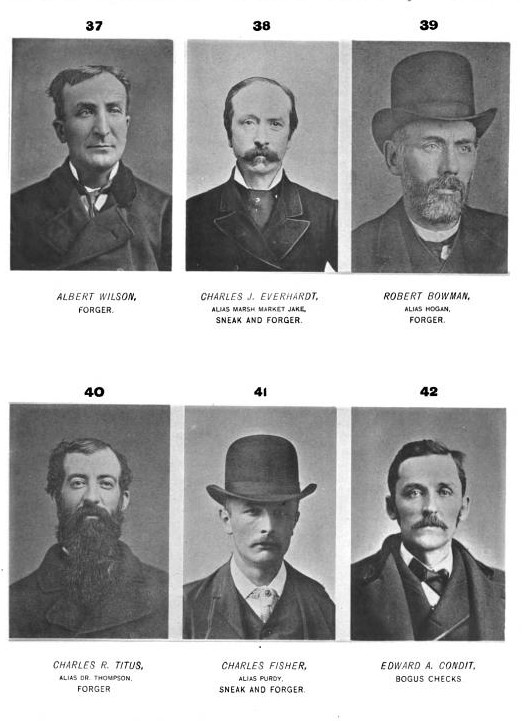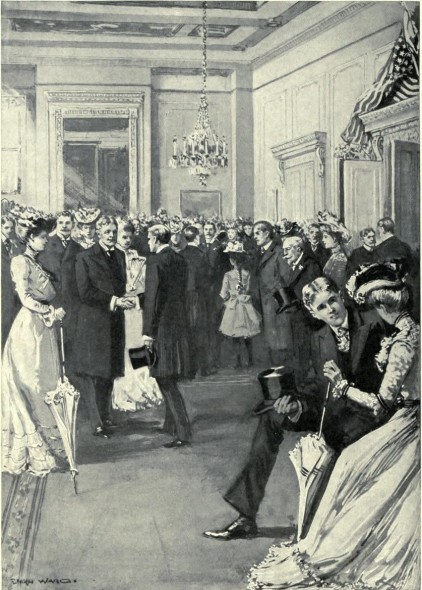
I watch a lot of old movies from the Golden Age of Hollywood, and I’ve seen my fair share of 1930s gangster flicks (George Raft is my favorite!). Films like The Public Enemy, Scarface, and Little Caesar are filled with slang that is now either obsolete or considered old-fashioned, but I was pretty surprised to discover how much of it existed long before the talkies. Josiah Flynt (pseudonym for sociologist Josiah Flynt Willard) made a career on books and articles about tramps and criminals in the underworld of Gilded Age America, and shared some criminal slang in his 1901 book, The World of Graft.
Beef: to “squeal”
Belch: to “split” on a pal
Big Man: the Pinkerton Detective Agency
Bit: a term in prison
Book: pocketbook
Bughouse: crazy
Call the Turn: give the name and record of a gun. When a detective identifies a criminal he is said to have called the turn on him,
Copped out: arrested
Crib: gambling dive
Dead: out of touch with current events in the world of graft; the antithesis of “wise.”
Dip: pickpocket
—On the dip: on a pickpocketing excursion
—Stalling for the dip: assisting the “tool,” or pickpocket, in arranging victims so that they can be successfully robbed.
Elbow: detective
Fall Money: funds saved by criminals to pay lawyers, secure cash bail, and to bribe officials
Fence: receiver of stolen property
Flatty: uniformed policeman
Finger: “”
Fly-cop: detective
Front Office: police headquarters
Get-Away: successful retreat with plunder
Gopher-Men: safe-blowers
Gun: thief
Holler: the plaint of the victim
Knock: also means to “squeal”
Leather: pocket-book
Mob: a collection of guns who work together. Five men generally make up a good-sized mob.
Moll-buzzer: a thief who targets women
Mouth-Piece: a thief in the pay of the police
Mug: this word really means face, but the crook uses it for photograph as well. A mugged thief is one whose picture is in the rogues’ gallery
Nick: to make a “touch”
Percentage Coppers: policemen and detectives who protect thieves in exchange for a percentage of their plunder
Peter: a safe
Peter-men: safe-blowers, bank men, etc
Porch-climber: second-story house worker
Prop-getters: thieves who make a specialty of “lifting” scarf-pins
Queer: counterfeit money
Rap: knock, beef, and squeal
Reef a leather: means raising the lining of a pocket in which the pickpocket has located a “book.” It is a difficult undertaking.
Shover of the queer: an utterer of counterfeit money
Slough-worker: country-house worker
Spot: a term in prison. A “one spot” means a sentence of one year.
Square it: to give up grafting
Squeal: in the case of a grafter, to betray another grafter. In the case of a victim, to make a fuss over his loss.
Stir: penitentiary
Stool-Pigeon: a thief in the pay of the police
Strong-Arm Man: highway-man
Swag: plunder other than cash, such as silks, jewelry, etc
Sweat-Box: a prisoner is put in the sweat-box when he is browbeaten by the police in order to make him divulge secrets in his profession. In New York this is called the “Third Degree.”
Thimble: a watch
Tip-off: a thief considers himself “tipped off” when a mouthpiece or detective points him out in the street or “calls the turn” on him at the Front Office
Tool: the man in a “mob” of pickpockets who does the real “nicking,” i.e., gets the pocketbook or roll of money
Touch: a man has been “touched” when the “tool” has got his “leather”
Yegg-men: tramp thieves. They are to be found large on the railroads.

